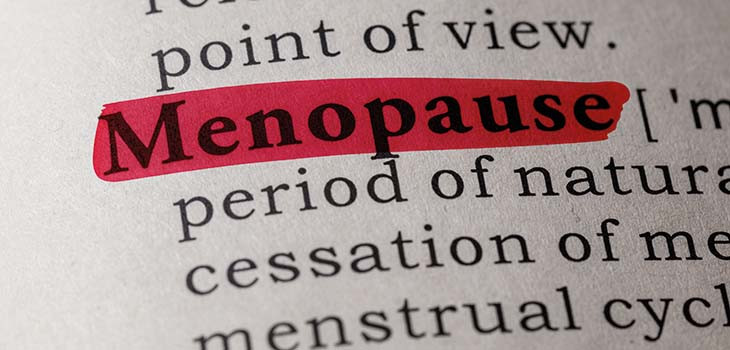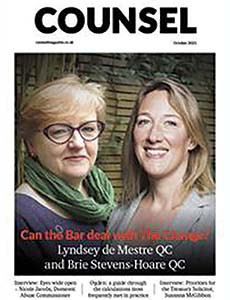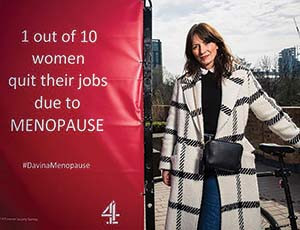*/

Menopause is not just an age or gender issue. It is a natural and inevitable stage of life that impacts us all – not just the women, and those who do not identify as women, who experience it directly. Around 51% of the UK workforce will have the menopause at some stage. Commonly, it occurs in the 45 to 55 age bracket but 1 in 100 people experience menopause before reaching 40, some because of medical treatment. The duration of symptoms also varies widely: they can start months or years before the last period. On average, most symptoms last around four years after the last period, but for 1 in 10 women, they could last for up to 12 years.
It is the indirect experience which impacts on us all in our interactions with others during the normal course of life and work. A 2019 survey by BUPA and CIPD found that three in five women were negatively affected at work, with almost 900,000 women having left their jobs because of menopausal symptoms – rising to almost a million by now. That costs individuals and businesses.
Conservatively, around 10% experience severe symptoms affecting work. A 2017 Department for Education research report, using 2015 data, gave a total of £7,276,334 of additional absence related costs for those with severe symptoms (The effects of menopause transition on women’s economic participation in the UK, Research report, DfE: July 2017, Joanna Brewis, Vanessa Beck, Andrea Davies and Jesse Matheson – University of Leicester).
Costs, however, go wider, including the loss of experience, loss in productivity and effectiveness, and in additional training and recruitment costs. This inevitably has an impact on the gender pay gap as well as a negative effect on the gender profile at senior levels. An effective framework for providing support for those in menopause transition makes sense in human and business terms.
The experience of menopause and adjustments needed will vary depending on the individual and the variability of work environments. Allocating a woman who experiences hot flushes work on the frozen food aisle is simple for supermarket workers, but it is not as easy when working on large-scale construction sites, for example.
Making adjustments for menopausal symptoms comes within the legal duty of care under the Health and Safety at Work Act 1974, and duties under the Management of Health and Safety at Work Regulations 1999. Acas in its 2019 guidance pointed out that an employer must minimise, reduce or where possible remove health and safety risks for workers. That means reviewing the workplace to ensure menopausal symptoms are not made worse by features of the workplace or work practices. Many of the adjustments, or accommodations, will stem from these health and safety requirements, with a risk assessment an important tool.
Despite the Health and Safety Executive’s important enforcement role, a look at the HSE website demonstrates what may be seen as a wider societal disregard of menopause. Searching for ‘menopause’ in February and May 2022 brings up as the first document ‘health and safety for older workers’: yet the word ‘menopause’ does not appear, while reference to a ‘decline in cognitive abilities’ does not reflect the transitional nature of menopause, nor the effect of HRT. As for the comment about ‘introducing self-paced training’, words fail this writer. The second HSE document ‘temperature in the workplace – FAQs’ includes the question: ‘What do I do with employees who may have a hormonal imbalance eg the menopause or employees with a thyroid imbalance?’
The House of Commons Women and Equalities Committee’s (WEC’s) inquiry into menopause and the workplace began in July 2021. WEC’s report, with recommendations to government, is due in ‘late Spring 2022’. WEC’s workplace survey showed one in three women missed work due to menopause symptoms, yet most had told no-one at work about their difficulties. WEC’s survey results, oral evidence and reports to the WEC Inquiry can be found here.
The HSE’s near silence on menopause lends support to the Discrimination Law Association’s evidence to WEC that the concept of ‘the workplace’ or ‘work’ is not gender-neutral: ‘Historically, working practices and structures have been designed around the life cycle of men rather than women.’
Sources of guidance and practical information are readily available. These range from Acas and the CIPD, to the TUC and individual unions. Unison’s October 2019 guidance and model policy provides a particularly practical and comprehensive approach.
However, despite additional protection under the Equality Act 2010 against discrimination, guidance from the Equality and Human Rights Commission has no specific reference to legal obligations in relation to the menopause. One of the recommendations made by Cloisters Chambers in its evidence to the WEC was that the EHRC expand its existing statutory code to explain the rights of those experiencing menopause.
Cloisters and others have recommended creating a specific protected characteristic of menopause, defined broadly enough to cover the whole transition. Currently, protection is patchwork and confusing for workers and employers alike. Having menopause as a protected characteristic would create clarity and certainty. Modelling protection on pregnancy and maternity, would be a right not to be treated unfavourably, with a right to reasonable adjustments to alleviate the adverse effects of menopause.
A menopause policy is a good start. Public sector employers subject to the public sector equality duty should already have these policies. That is because of the duty to have due regard to the need to promote equality between different groups and also to take account of the needs of members of one protected characteristic group which are different to the needs of those outside that group.
The TUC in its oral evidence to the WEC stressed the importance of changing the closed culture so as to treat menopause as a workplace health issue. Although a policy is not a ‘silver bullet’, it shows explicit commitment, signalling the employer is open to a conversation about what is required. Senior leadership also need to be actively engaged.
More important than policy is its implementation. The framework for putting policy into practice needs to be in place. For example, adding menopause and health issues to the on-boarding processes, to other policies, and to inclusivity training as a start. Absence policies, in particular, should address menopause and triggers for disciplinary action. Flexible working arrangements, some short-term and adjustable, will also help.
Supporting people through the menopause makes good business sense. In 2020, a BUPA survey found that women who had to take long-term time off work because of menopausal symptoms took an average of 32 weeks off work. Small adjustments may reduce sickness absence. For example, a later start for those affected by insomnia.
CIPD and others recommend training line managers because of their pivotal role in supporting people transitioning menopause. Line managers, some of whom will have direct experience of menopause, are also likely to be a good source of practical suggestions, as are individual workers. Listening to a worker, for example, led one firm to scrap the red tape form filling required to order a desk fan: fans are now provided in response to a stationary order.
The whole process of implementing menopause-friendly practices is likely to increase worker engagement and loyalty. Training line managers in how best to start conversations about menopausal needs should increase their people skills and 1-2-1 communications generally. A side effect could be that those skills help resolve incipient grievances at an earlier stage, saving time and energy for all.
Ultimately, the core rationale for introducing menopause-friendly practices is to avoid the waste of experience and knowledge in losing women, and those who do not identify as women, just because they are not supported through a temporary stage in their lives.


The recent, much publicised shortage of HRT is just one aspect of the wider societal disregard of a life stage impacting 51% of the UK workforce. Davina McCall’s documentary, Sex, Mind and the Menopause, currently streaming on Channel 4, has been widely praised for raising awareness.
In a growing movement, employers are being called upon to sign the Wellbeing of Women/Hello! Menopause Workplace Pledge and take positive action to make sure everyone going through the menopause is supported.

Menopause is not just an age or gender issue. It is a natural and inevitable stage of life that impacts us all – not just the women, and those who do not identify as women, who experience it directly. Around 51% of the UK workforce will have the menopause at some stage. Commonly, it occurs in the 45 to 55 age bracket but 1 in 100 people experience menopause before reaching 40, some because of medical treatment. The duration of symptoms also varies widely: they can start months or years before the last period. On average, most symptoms last around four years after the last period, but for 1 in 10 women, they could last for up to 12 years.
It is the indirect experience which impacts on us all in our interactions with others during the normal course of life and work. A 2019 survey by BUPA and CIPD found that three in five women were negatively affected at work, with almost 900,000 women having left their jobs because of menopausal symptoms – rising to almost a million by now. That costs individuals and businesses.
Conservatively, around 10% experience severe symptoms affecting work. A 2017 Department for Education research report, using 2015 data, gave a total of £7,276,334 of additional absence related costs for those with severe symptoms (The effects of menopause transition on women’s economic participation in the UK, Research report, DfE: July 2017, Joanna Brewis, Vanessa Beck, Andrea Davies and Jesse Matheson – University of Leicester).
Costs, however, go wider, including the loss of experience, loss in productivity and effectiveness, and in additional training and recruitment costs. This inevitably has an impact on the gender pay gap as well as a negative effect on the gender profile at senior levels. An effective framework for providing support for those in menopause transition makes sense in human and business terms.
The experience of menopause and adjustments needed will vary depending on the individual and the variability of work environments. Allocating a woman who experiences hot flushes work on the frozen food aisle is simple for supermarket workers, but it is not as easy when working on large-scale construction sites, for example.
Making adjustments for menopausal symptoms comes within the legal duty of care under the Health and Safety at Work Act 1974, and duties under the Management of Health and Safety at Work Regulations 1999. Acas in its 2019 guidance pointed out that an employer must minimise, reduce or where possible remove health and safety risks for workers. That means reviewing the workplace to ensure menopausal symptoms are not made worse by features of the workplace or work practices. Many of the adjustments, or accommodations, will stem from these health and safety requirements, with a risk assessment an important tool.
Despite the Health and Safety Executive’s important enforcement role, a look at the HSE website demonstrates what may be seen as a wider societal disregard of menopause. Searching for ‘menopause’ in February and May 2022 brings up as the first document ‘health and safety for older workers’: yet the word ‘menopause’ does not appear, while reference to a ‘decline in cognitive abilities’ does not reflect the transitional nature of menopause, nor the effect of HRT. As for the comment about ‘introducing self-paced training’, words fail this writer. The second HSE document ‘temperature in the workplace – FAQs’ includes the question: ‘What do I do with employees who may have a hormonal imbalance eg the menopause or employees with a thyroid imbalance?’
The House of Commons Women and Equalities Committee’s (WEC’s) inquiry into menopause and the workplace began in July 2021. WEC’s report, with recommendations to government, is due in ‘late Spring 2022’. WEC’s workplace survey showed one in three women missed work due to menopause symptoms, yet most had told no-one at work about their difficulties. WEC’s survey results, oral evidence and reports to the WEC Inquiry can be found here.
The HSE’s near silence on menopause lends support to the Discrimination Law Association’s evidence to WEC that the concept of ‘the workplace’ or ‘work’ is not gender-neutral: ‘Historically, working practices and structures have been designed around the life cycle of men rather than women.’
Sources of guidance and practical information are readily available. These range from Acas and the CIPD, to the TUC and individual unions. Unison’s October 2019 guidance and model policy provides a particularly practical and comprehensive approach.
However, despite additional protection under the Equality Act 2010 against discrimination, guidance from the Equality and Human Rights Commission has no specific reference to legal obligations in relation to the menopause. One of the recommendations made by Cloisters Chambers in its evidence to the WEC was that the EHRC expand its existing statutory code to explain the rights of those experiencing menopause.
Cloisters and others have recommended creating a specific protected characteristic of menopause, defined broadly enough to cover the whole transition. Currently, protection is patchwork and confusing for workers and employers alike. Having menopause as a protected characteristic would create clarity and certainty. Modelling protection on pregnancy and maternity, would be a right not to be treated unfavourably, with a right to reasonable adjustments to alleviate the adverse effects of menopause.
A menopause policy is a good start. Public sector employers subject to the public sector equality duty should already have these policies. That is because of the duty to have due regard to the need to promote equality between different groups and also to take account of the needs of members of one protected characteristic group which are different to the needs of those outside that group.
The TUC in its oral evidence to the WEC stressed the importance of changing the closed culture so as to treat menopause as a workplace health issue. Although a policy is not a ‘silver bullet’, it shows explicit commitment, signalling the employer is open to a conversation about what is required. Senior leadership also need to be actively engaged.
More important than policy is its implementation. The framework for putting policy into practice needs to be in place. For example, adding menopause and health issues to the on-boarding processes, to other policies, and to inclusivity training as a start. Absence policies, in particular, should address menopause and triggers for disciplinary action. Flexible working arrangements, some short-term and adjustable, will also help.
Supporting people through the menopause makes good business sense. In 2020, a BUPA survey found that women who had to take long-term time off work because of menopausal symptoms took an average of 32 weeks off work. Small adjustments may reduce sickness absence. For example, a later start for those affected by insomnia.
CIPD and others recommend training line managers because of their pivotal role in supporting people transitioning menopause. Line managers, some of whom will have direct experience of menopause, are also likely to be a good source of practical suggestions, as are individual workers. Listening to a worker, for example, led one firm to scrap the red tape form filling required to order a desk fan: fans are now provided in response to a stationary order.
The whole process of implementing menopause-friendly practices is likely to increase worker engagement and loyalty. Training line managers in how best to start conversations about menopausal needs should increase their people skills and 1-2-1 communications generally. A side effect could be that those skills help resolve incipient grievances at an earlier stage, saving time and energy for all.
Ultimately, the core rationale for introducing menopause-friendly practices is to avoid the waste of experience and knowledge in losing women, and those who do not identify as women, just because they are not supported through a temporary stage in their lives.


The recent, much publicised shortage of HRT is just one aspect of the wider societal disregard of a life stage impacting 51% of the UK workforce. Davina McCall’s documentary, Sex, Mind and the Menopause, currently streaming on Channel 4, has been widely praised for raising awareness.
In a growing movement, employers are being called upon to sign the Wellbeing of Women/Hello! Menopause Workplace Pledge and take positive action to make sure everyone going through the menopause is supported.


The Bar Council is ready to support a turn to the efficiencies that will make a difference
By Louise Crush of Westgate Wealth Management
Marie Law, Director of Toxicology at AlphaBiolabs, examines the latest ONS data on drug misuse and its implications for toxicology testing in family law cases
An interview with Rob Wagg, CEO of New Park Court Chambers
What meaningful steps can you take in 2026 to advance your legal career? asks Thomas Cowan of St Pauls Chambers
Marie Law, Director of Toxicology at AlphaBiolabs, explains why drugs may appear in test results, despite the donor denying use of them
Ever wondered what a pupillage is like at the CPS? This Q and A provides an insight into the training, experience and next steps
The appointments of 96 new King’s Counsel (also known as silk) are announced today
Ready for the new way to do tax returns? David Southern KC continues his series explaining the impact on barristers. In part 2, a worked example shows the specific practicalities of adapting to the new system
Resolution of the criminal justice crisis does not lie in reheating old ideas that have been roundly rejected before, say Ed Vickers KC, Faras Baloch and Katie Bacon
With pupillage application season under way, Laura Wright reflects on her route to ‘tech barrister’ and offers advice for those aiming at a career at the Bar